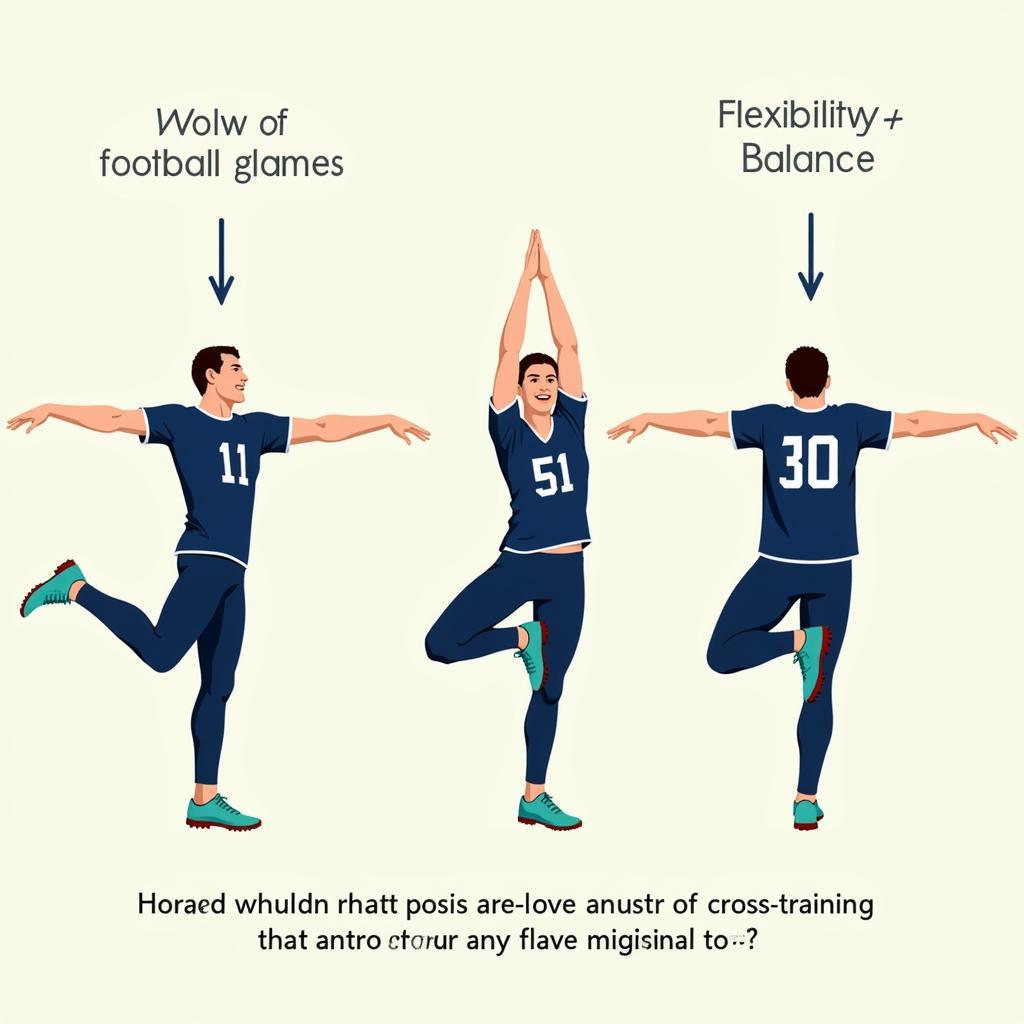Cross-Training for Football Players: Boosting Performance On and Off the Pitch
January 9, 2025Cross-training is an essential aspect of any serious footballer’s training regimen. It involves engaging in various exercises and activities outside of traditional football drills to enhance overall athleticism and reduce the risk of injuries. By incorporating cross-training, players like myself can improve performance, build strength, and increase endurance, leading to a more successful career on the pitch.
The Benefits of Cross-Training in Football
Cross-training offers a wide range of benefits for football players of all levels. From improving cardiovascular fitness to enhancing agility and preventing overuse injuries, it’s a crucial element for reaching peak performance.
- Injury Prevention: Football is a high-impact sport, placing significant stress on specific muscle groups. Cross-training helps develop balanced strength and flexibility, reducing the risk of common football injuries like hamstring pulls, groin strains, and ACL tears.
- Enhanced Cardiovascular Fitness: Activities like swimming, cycling, and running build stamina and improve lung capacity, essential for lasting the full 90 minutes and extra time if needed.
- Improved Muscle Strength and Power: Cross-training exercises, such as weightlifting and plyometrics, strengthen muscles used in football-specific movements like jumping, sprinting, and tackling.
- Increased Agility and Flexibility: Engaging in activities like yoga and Pilates improves flexibility and balance, leading to enhanced agility and quicker reactions on the field.
- Mental Refreshment: Breaking the monotony of regular football training can prevent mental burnout and keep players motivated and engaged.
Different Types of Cross-Training for Footballers
There are various cross-training activities that footballers can incorporate into their routines, each offering unique benefits.
Swimming: Building Endurance and Recovery
Swimming is a low-impact exercise that’s excellent for building cardiovascular fitness and aiding muscle recovery. It works various muscle groups without putting stress on joints, making it ideal for active recovery after intense training sessions.
Cycling: Enhancing Lower Body Strength
Cycling improves lower body strength and endurance, crucial for powerful sprints and sustained running during matches. It’s also a great way to improve cardiovascular health without putting excessive stress on the joints.
Weight Training: Building Strength and Power
Weight training helps develop muscle strength and power, essential for tackling, jumping, and shooting. Focus on compound exercises that work multiple muscle groups simultaneously for maximum benefit.
Incorporating Cross-Training into Your Football Schedule
Integrating cross-training effectively requires careful planning and consideration of your overall training load.
Listen to Your Body
Pay attention to your body’s signals and adjust your cross-training activities accordingly. Avoid overtraining and prioritize rest and recovery.
Consult with Professionals
Seek advice from qualified strength and conditioning coaches or sports therapists to create a personalized cross-training program tailored to your needs and goals.
Gradual Progression
Start with shorter durations and lower intensities for cross-training activities, gradually increasing the workload as your fitness improves.
Why is Cross-Training Important for Football Players?
Cross-training is important because it helps prevent injuries, improves overall athleticism, and provides mental refreshment.
What are the Best Cross-Training Exercises for Football?
The best cross-training exercises include swimming, cycling, weight training, yoga, and Pilates. These activities offer a range of benefits, from improving cardiovascular fitness to enhancing strength, flexibility, and agility.
 Yoga for Footballers
Yoga for Footballers
Conclusion: Cross-Training for Peak Football Performance
Cross-training is not just a supplementary activity; it’s a crucial component of a comprehensive training plan for any serious footballer. By incorporating diverse exercises and activities, players can elevate their performance, reduce injury risk, and achieve long-term success in the demanding world of professional football. Don’t just train, cross-train to become a more well-rounded and resilient athlete.
FAQ
- How often should I cross-train?
- What are the benefits of swimming for football players?
- Can cross-training help prevent hamstring injuries?
- What are some good cross-training exercises for improving agility?
- How can I incorporate cross-training into my busy schedule?
- Is weight training beneficial for football players?
- How can I avoid overtraining while cross-training?
Need more assistance? Contact us at Phone Number: 0396443476, Email: [email protected] Or visit us at: 23 Tháng 3, Đắk Nia, Gia Nghĩa, Đắk Nông, Việt Nam. We have a 24/7 customer support team.